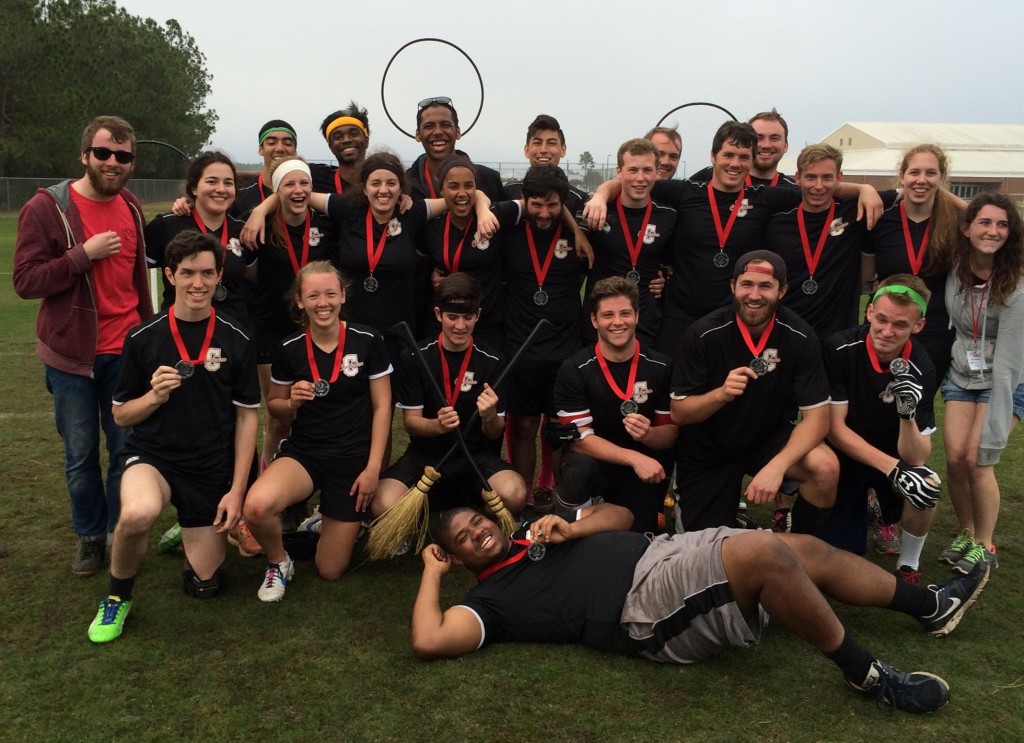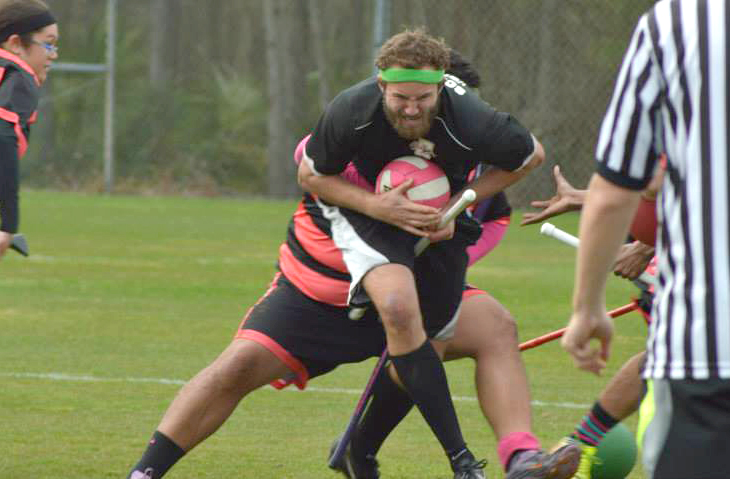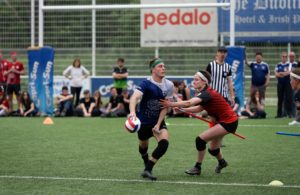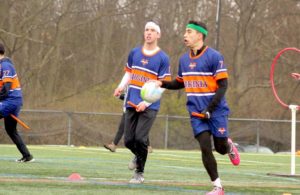- Rule, Britannia, no more?
- Unpopular Opinions: US Quadball Cup 2023
- Proven Contenders: University of Virginia
- Proven Contenders: Rutgers University
- Proven Contenders: University of Michigan
- Proven Contenders: Creighton University
- Different Perspectives: A Look Inside USA Ultimate
- Antwerp QC, Much of Belgian Core, Leaves Competitive Quidditch
College of Who?
- By Max Miceli
- Updated: March 4, 2015
The South Regional Championship was a Cinderella story like no other. The only problem was after College of Charleston’s theoretical clock struck midnight, the team’s proverbial Prince Charming didn’t return to find team president and starting keeper Steven Schwark and sweep him off his feet.
Charleston may have lost to Florida’s Finest in the finals of the South Regional Championship with a scoreline that suggested a bit of a blowout, but don’t let the 190-150* final confuse you. The Cougars can stick with any team in the South–period.
All too frequently, South Carolina teams are left out of the discussion of top squads in the South Region, much like Arkansas is forgotten in the Southwest. The teams’ lack of proximity and exposure to other opponents in the South–particularly in Florida–led Charleston to show up to its regional as a vastly underrated competitor.
“That’s cool, but look at Charleston’s record before the regional,” you might be saying as you read this. “Why should we have expected this team to be anything more than what its record suggests?”
You are correct–a 3-6 record is pretty underwhelming, and we’re not going to attempt to justify it. But let us offer a bit of context first.
Four of the team’s six losses came when the team didn’t have Schwark at the helm. OK, we get it–teams need to have depth and missing players isn’t an excuse for poor performance. But if the Miami Heat didn’t have LeBron James, the team wouldn’t have made a single final in the past four years, much less make it all four years and win two rings. Depth is important, and it definitely matters in quidditch, but there are few if any teams in this sport that can sub out a 6-foot-4, 210-pound star and expect to still be just as effective. I’m not trying to compare Schwark to LeBron by any means, but you can’t coach a player to be 6-foot-4 and athletic. In the South–a relatively shallow region–that one player can make a big difference.
On top of missing Schwark in many of Charleston’s losses, three of them came against the same top-tier team. This South Carolina squad has gotten it handed to it by UNC three times. Sure, UNC isn’t an out-of-this-world opponent, but the Tar Heels have a habit of running up scores on teams that don’t necessarily match up well with them. When half of a team’s losses are to a Top-20 team like UNC, it’s hard to hold that against anyone. Add in the fact that Charleston’s only two losses with Schwark before regionals were against the Tar Heels, and you get a little bit closer to understanding this team.
I’m not saying this means we should have expected anything more from the Cougars than what happened at last year’s regional, where the team went 1-3, lost to a team another of our writers told us we should all be pissed about and failed to qualify, but it’s a start in explaining how exactly its second-place finish at the South Regional came about.
I’ll be completely honest; I didn’t see this coming myself. The few times I played against Charleston, the squad didn’t necessarily impress me. The team has an athletic chasing lineup, decent beaters and a good seeking game, but it wasn’t until the team lost its first game 90*-80 against Florida’s Finest that I realized the potential Charleston had in such a shallow region.
With all of the teams from South Carolina virtually controlling every bludger game leading up to the South Regional final, it was only appropriate that the South Carolina squad with the strongest chasing lineup and the best seeker would make a run to the finals.
For some reason, beaters from the Southern Storm Griffins, University of South Carolina and Charleston–all of whom qualified–outclassed the Florida teams’ beaters. I’m not claiming to have been there or have seen any footage outside of the finals, but from what I’ve heard from multiple, reliable sources, Carolina teams frequently dominated the beater game. This might have occurred because of Florida beaters primarily playing in a vacuum against one another, but either way, the effects couldn’t have been more apparent.
After depreciating its record to 3-7 on the season with a painful loss at the hands of Florida’s Finest, a team many spectators claimed Charleston outplayed, the Cougars did what you might expect from a team that nearly upset The Eighth Man’s No. 12-ranked team in the nation–they won.
And Charleston kept winning. Beating Florida State University and TTU, the team clinched its World Cup bid by locking up the No. 4 seed in bracket play.
But day two was filled with its own drama.
Ending up on the same side of the bracket as South Carolina–whose beaters used a particularly aggressive approach, beating opposing keepers as soon as they left their zone in order to force turnovers–Charleston was forced to compete with its in-state rival by breaking away from its normal defensive strategy. While Charleston tends to use a point-beater man defense, the team moved to a zone defense against the extremely aggressive Gamecock beaters in an attempt to compact itself. Since South Carolina generally uses a dual-male beating set and has limited offensive weapons, Charleston’s ability to adapt held at bay an offense that dropped 150 quaffle points against University of South Florida, a South Regional Championship semifinalist.
In an equally intense match in the semifinals against University of Miami, Charleston’s small but quick seeker Matt Corder caught his fourth snitch of the tournament in five games–three of which were SWIM-situation grabs–to give the team a finals berth.
In the championship match, with cards flying everywhere, the Cougars were holding on for dear life in their rematch against Florida’s Finest. Teetering on the edge of snitch range with the snitch on pitch, they lost Corder and Schwark to double yellows. While most people who don’t know this team would say that suiciding in the final of a regional isn’t fathomable, it’s something you all should start fathoming. Down by 70 with its two most valuable players ejected in a game with an already-handicapped snitch, it was only a matter of time before Charleston was handed the loss.
The clock had officially struck midnight. With its second loss to Florida’s Finest, Charleston moved to 7-8 on the year and became the only team with a losing record to play in its regional championship. The team will likely receive little praise leading up to World Cup, but for one weekend in Florida, Charleston proved that it too was one of the finest in the South.
Contributed reporting by Ethan Sturm.





